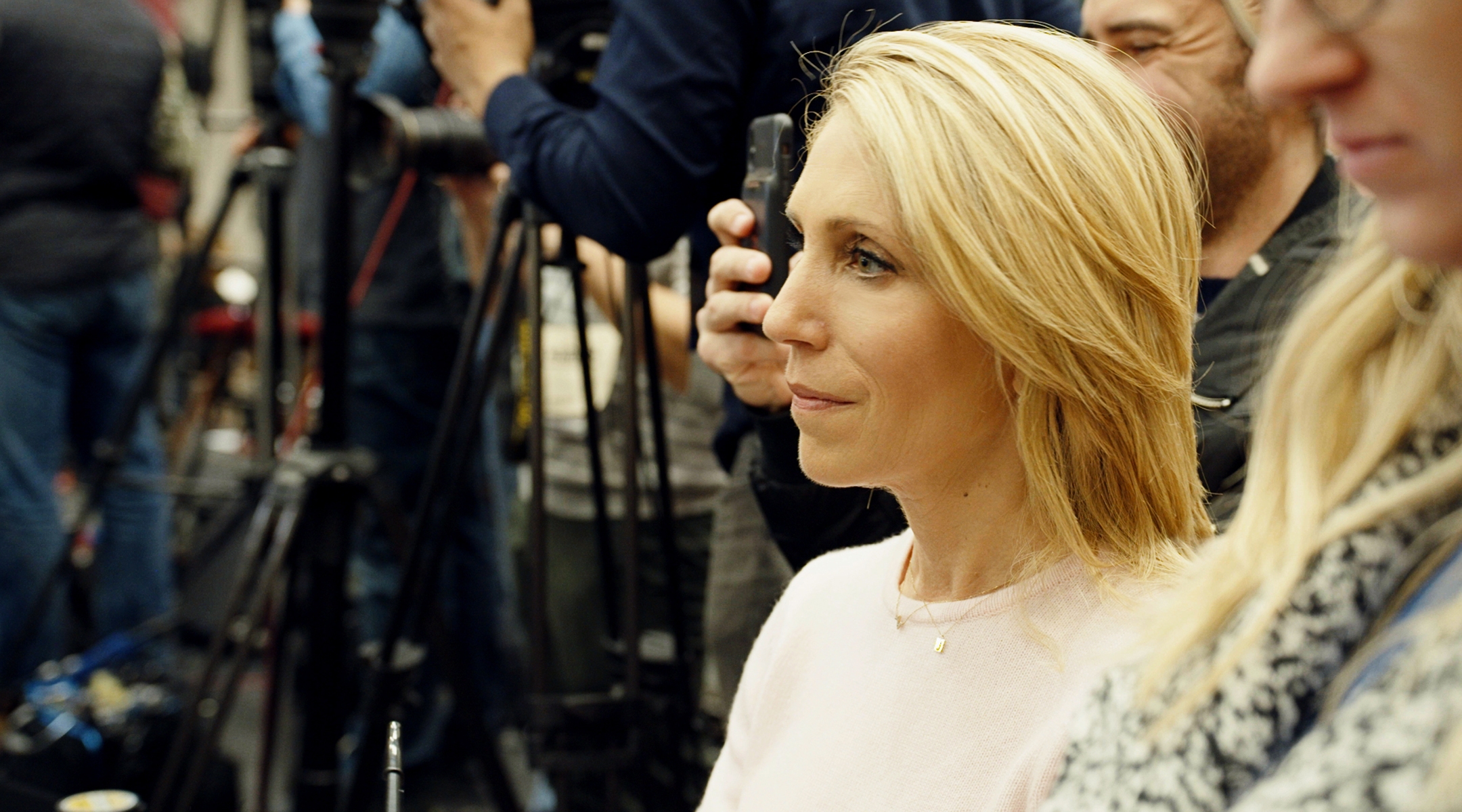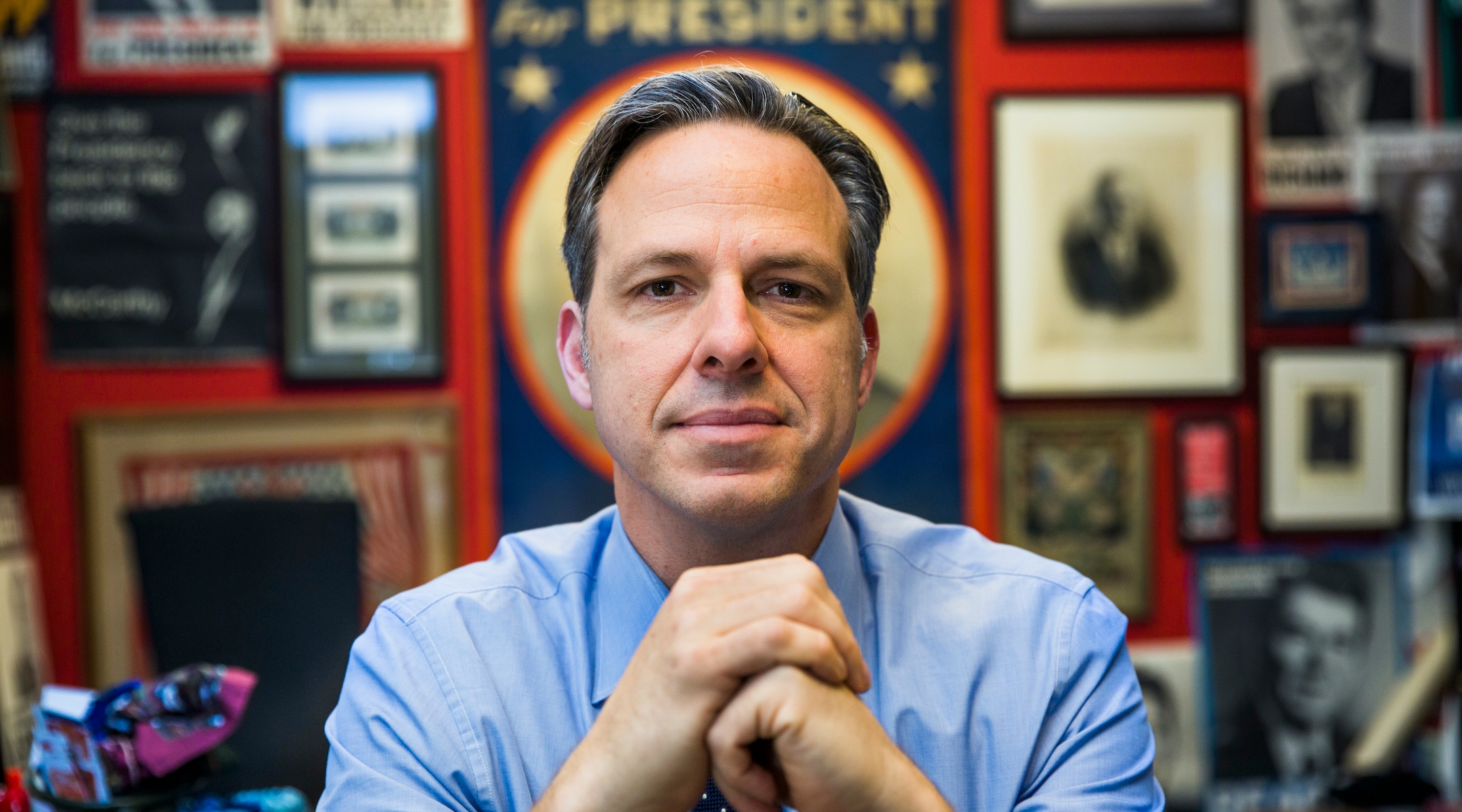WASHINGTON — When Joe Biden and Donald Trump meet Thursday night for their first debate this election season, they will face two moderators with a lot in common.
Dana Bash and Jake Tapper are both veteran CNN anchors famous for their no-nonsense style. They both panned the first Biden-Trump debate in 2020, Tapper calling it a “hot mess” and Bash calling it a “s—show.” And they’ve both infused their Jewish identity into their reporting.
In fact, Bash and Tapper are congregants at the same Washington synagogue: Temple Micah, a Reform congregation known for its progressive advocacy and for attracting members from the city’s political, government and media elite.
Here’s what you need to know about the two Jewish anchors helming the first of two presidential debates in 2024.
Dana Bash’s family Holocaust history has informed her reporting on antisemitism.
Bash is CNN’s chief political correspondent and anchors her own show, “Inside Politics with Dana Bash,” in addition to coanchoring “State of the Union,” a Sunday morning show, with Tapper.
Bash, 53, was born in New York City to a mother who was a Jewish educator and a father who worked in news. She graduated from George Washington University before embarking on her own career in journalism.

Dana Bash, a correspondent and anchor on CNN. (CNN/HBO Max)
Bash came under attack from conservatives a decade ago after accepting a role as trustee at Jewish Women International over the group’s support for abortion access. Bash resigned from the role.
In 2022, while working on a CNN documentary about antisemitism, Bash turned to Temple Micah’s rabbi, Danny Zemel, for advice on navigating discussing antisemitism on the left.
“I called him, and I said, ‘You have to help me here, because I have to get this right,’” Bash told the Jewish Telegraphic Agency at the time. “And I talked it through with him. He completely understood, because not everybody who’s on the progressive left, who stands up and says they’re an anti-Zionist, really means that they’re anti-Jewish, that they’re antisemitic.”
In conjunction with the documentary, she published an op-ed on CNN’s website on how she grappled with conflicting emotions when her preteen son asked for a Star of David necklace for Hanukkah. She was moved by his pride in his faith, but haunted by how her Hungarian great-grandparents were murdered at Auschwitz.
“What I did not say – what I was ashamed to even admit to myself – was that my young son showing the world that he is Jewish made me nervous,” Bash wrote.
Bash was married to John King, another CNN anchor, and they have had a famously amicable divorce, at times discussing their shared parental responsibilities. (She was previously married to Jeremy Bash, an attorney who worked in the Obama administration.) King grew emotional on air as he discussed his son’s choice to make his Jewish identity visible.
Bash, 53, has since then remained outspoken about antisemitism, expressing alarm at the harassment some Jewish students have faced since the launch of Israel’s war with Hamas.
“Many of these protests started peacefully, with legitimate questions about the war. But in many cases, they lost the plot,” Bash said in May. “Now, protesting the way the Israeli government, the Israeli prime minister is prosecuting the retaliatory war against Hamas is one thing. Making Jewish students feel unsafe at their own schools is unacceptable. And it is happening, way too much, right now.”
In December, she asked Rep. Pramila Jayapal, the Washington Democrat who chairs the congressional Progressive Caucus, about the failure among progressives to condemn Hamas’ sexual violence.
Jayapal said she condemned the violence, and then pivoted to what she called Israel’s war crimes — eliciting a rebuke of the sort that debate viewers might expect on Thursday night.
“With respect I was just asking about the women, and you turned it back to Israel,” Bash said.
Jake Tapper graduated from Jewish day school and has come under attack from the right and the left.
Tapper is CNN’s chief Washington correspondent and anchors his own daily show, “The Lead with Jake Tapper” as well as co-hosting “State of the Union” with Bash.
Tapper, 55, graduated from the Akiba Hebrew Academy in Philadelphia (now the Jack M. Barrack Hebrew Academy) before attending Dartmouth College. A breakout moment in his development as a journalist came in 1998 when he wrote about having gone on a date with Monica Lewinsky just before the news broke that she had been involved in an affair with President Bill Clinton. (“My mom, in fact, would love her. Dad, too. She’s Jewish, for one thing,” he wrote.)
Tapper told JTA in 2021 that his Jewish education shaped his determination to challenge authority through journalism.
“Jewish education gave me a lot of ways, one of which was obviously a respect for faith — not just for Judaism, but for all faiths, Christianity, Islam, everything — and then I think also just the tradition of debate that I learned, both in the school itself but also by reading the Talmud,” he said. “What I appreciated at the time was how much we were encouraged to consider other points of view.”

Jake Tapper in his Washington CNN office, which is decorated with posters from losing U.S. presidential campaigns over the decades, in 2016. (Brooks Kraft/Getty Images)
Tapper has frequently inserted his Jewish knowledge and identity into his reporting, for example bringing Volodomyr Zelensky matzoh when he scored a wartime interview in 2022 during Passover with the Jewish president of Ukraine.
Tapper also introduced a well known Jewish phrase into the CNN lexicon: “May his memory be a blessing,” invoked when addressing a recent death.
He was using it so frequently during the coronavirus pandemic that he brought a rabbi on air to explain its meaning.
“There’s a Jewish expression of condolence that I use every time I do an obituary on my show, which I had been doing, kind of doing every day, because of COVID,” Tapper said in February 2021 on a segment marking the 500,000th death from the virus. “The expression is ‘may his or her memory be a blessing.’ What do we take from those words?”
Rabbi Anne Brener explained how painful memories evolve into blessings over time. The anchor asked her to lead a prayer for the dead — an unusual moment for cable news.
Even in his role as a journalist, Tapper tends to join battles for causes he believes in, and it can lead to rhetorical blows exchanged with the left and the right. In 2017 he took on the Women’s March for its celebration of a convicted cop killer, which devolved into a Twitter fight with Linda Sarsour, the Palestinian activist, who accused Tapper of joining the “alt-right.”
A year before, Tapper had confronted then-candidate Trump on why he had yet to denounce an endorsement from David Duke, the one-time Klansman and unabashed antisemite.
Late last year, Tapper, covering the war from Israel, called out far-right Georgia Republican Rep. Marjorie Taylor Greene for abusing the term antisemitism when she applied it to Rep. Rashida Tlaib, the Palestinian American Michigan Democrat. “This shit is not a game,” he said in a mini-editorial.
He also tussled with Tlaib in 2019, when she misconstrued a comparison he made between Palestinian leaders who incite terrorism and white supremacists who incite violence.
His most in-the-weeds Jewish to and fro probably came during Trump’s impeachment for spurring the Jan. 6 deadly insurrection at the capitol: He quoted on Twitter, much to the fury of Trump’s Jewish backers, a passage in Exodus addressed to Trump’s Orthodox Jewish attorney, David Schoen.
“You shall not spread a false report. You shall not join hands with a wicked man to be a malicious witness,” Tapper wrote. “You shall not fall in with the many to do evil, nor shall you bear witness in a lawsuit, siding with the many, so as to pervert justice.”
Now ahead of the debate, Tapper is getting it from the left and the right, again. Code Pink, the antiwar group, this week positioned activists outside his home accusing him of covering for genocide for his Israel-related reporting. The protest devolved into shouted recrimination at Tapper’s children, who waved at the protesters and played the national anthem.
“You may be laughing now, but one day you will realize the damage that your dad has caused and I promise this big house won’t be worth it,” said a protester.
Trump, meantime, has taken to nicknaming him “Fake Tapper” because Tapper has noted the parallels between Trump’s anti-immigrant rhetoric, accusing migrants of “poisoning” the American bloodstream, with Adolf Hitler’s, who leveled the same accusation at Jews.
Whether that nickname makes it to the debate stage remains to be seen.
JTA has documented Jewish history in real-time for over a century. Keep our journalism strong by joining us in supporting independent, award-winning reporting.






